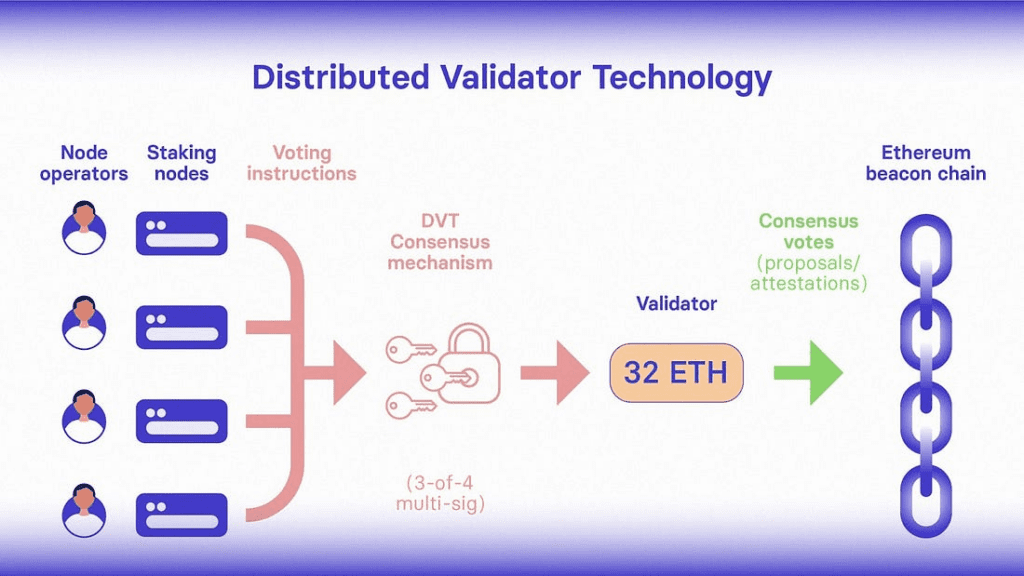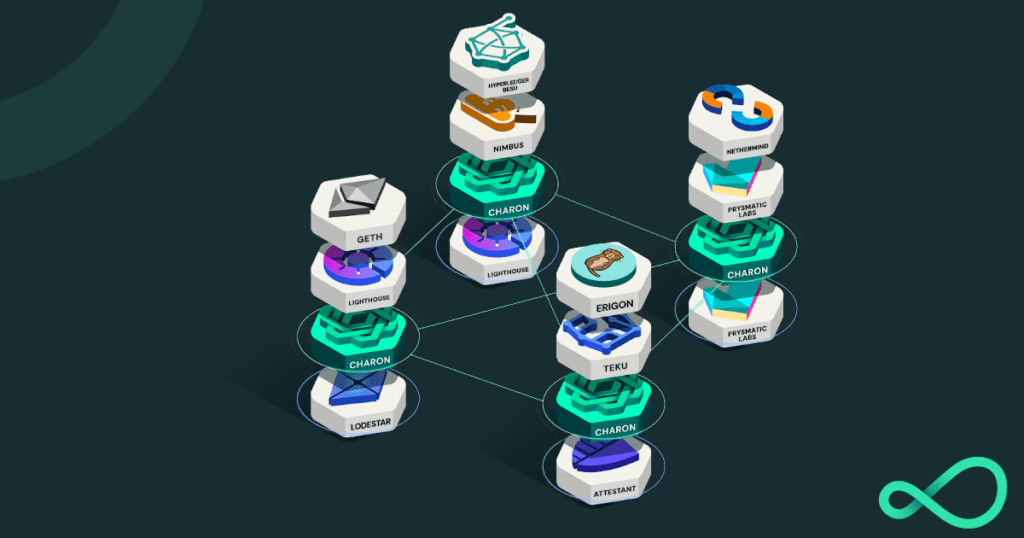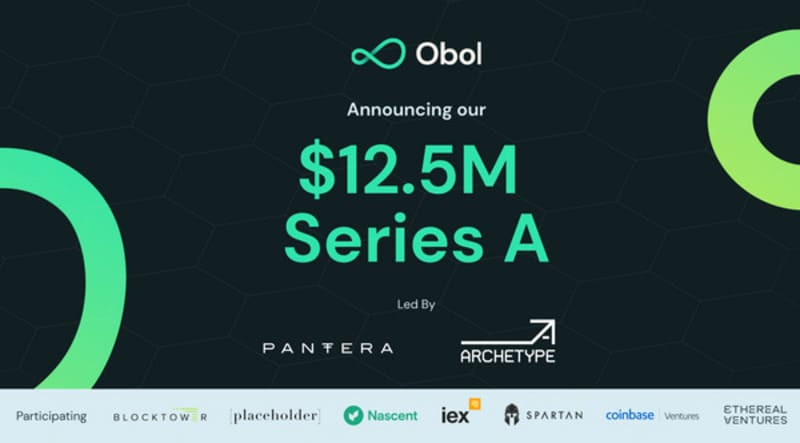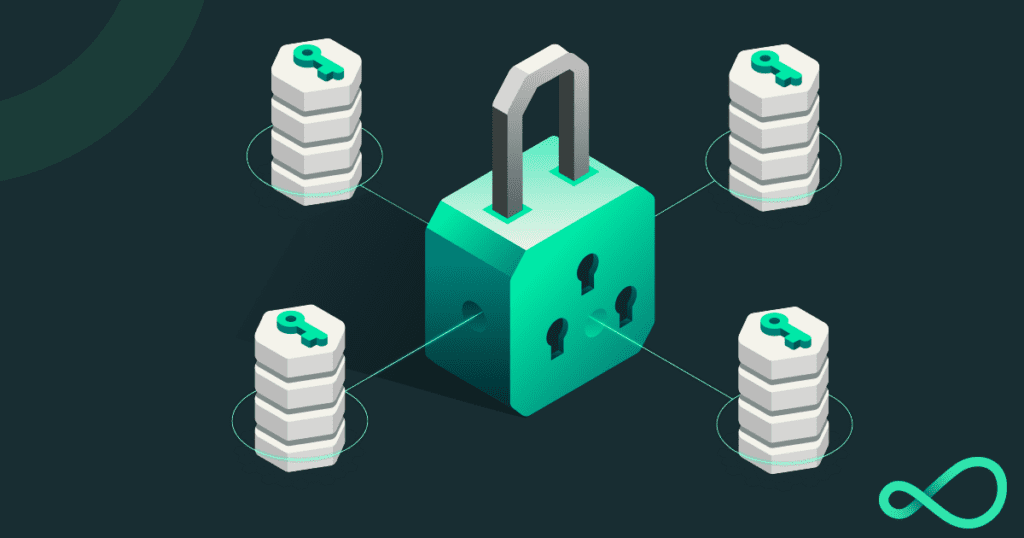Ethereum has had a significant milestone when converting the consensus mechanism from Proof of Work (POW) to Proof of Stake (POS) through The Merge event in September 2022. However, the conversion will cause problems related to the operation and handling of validators. From here, Obol Network is considered a bright spot when it comes to solving the validator problem through Distributed Validator Technology (DVT) – their distributed validator. Through it, the protocol promotes staking on Ethereum by using a validation mechanism through various validators.
The focus is now on making staking on Ethereum more decentralized, scalable, simpler, secure, independent bettors friendly, and less heavily penalized. Let’s find out how Obol Network has applied DVT to achieve its goal of bringing efficiency to staking on Ethereum.
וואָס איז DVT?
Distributed validator technology (DVT) allows Ethereum Proof-of-Stake (PoS) validators to run on multiple nodes or machines (known as distributed validators), collaborating in real-time for validation transactions.
DVT solves the main problems faced by single-node validators, including machine failure, connection problems, risk of penalties, private key leakage, and high join costs.
It increases validator resiliency by creating redundancy in a single network validator, e.g., when one node or machine(s) fails, other nodes in the cluster keep the validator going and continue running (redundant-active, redundant-active-active). It also reduces infrastructure costs by reducing the risk of nodes going offline, allowing more validators to be run on fewer machines (a major barrier to profitability for large validator operators).

DVT makes it easier for validators of all sizes to participate and be more active. For small validators, DVT reduces the association requirements per node in the cluster, allowing multiple miners to cooperate to meet a total requirement of 32 ETH to run the validator.
Ultimately, DVT promotes the decentralization of validators on a larger scale and increases the participation of validators, thus building a more stable, secure, and reliable Ethereum for the world.
Obol Lab and the Obol Network
Obol Labs is a professional research group focused on developing proof-of-stake (PoS) infrastructure and providing solutions for public blockchain networks. The main goal is to enhance the resiliency, scalability, and security of the Ethereum consensus layer. Today’s focus is on Scaling the Ethereum Mainnet by building and promoting DVT.
Obol Labs has facilitated the adoption of DVT through the Obol Network, an open source toolkit for reliability mitigation, including Distributed Validator Trigger, Charon, Obol Splitter, and Test Obol Network.
The Distributed Validator Launcher is a user-friendly interface to help start distributed validators; while Charon is a middleware client that allows validators to run in a distributed and fault-tolerant manner; Obol Splitters includes a suite of Solidity, enabling, and ultimately Obol Testnets Smart Contract Components, a growing set of public incentive testnets designed to allow operators of all sizes to test testing before deploying to the Ethereum mainnet.

With Obol, users can quickly and easily join the pool of validators and enable decentralized applications more resistant to censorship and third-party control.
By opening up new ways for users to participate in the verification and activation of the decentralized network, Obol is tapping into the potential of the Ethereum network and making it more accessible to more users.

Obol raised $12.5 million in a Series A funding round in January 2023. Leading the funding round included funds such as Pantera Capital & Archetype, Coinbase Ventures, Nascent, BlockTower, Placeholder, Ethereal Ventures, Spartan, and IEX. In addition, many famous validators, such as Stakely, Cosmostation, Kukis Global, and Swiss Staking also participated in the funding. The total amount Obol received is about 19 million USD. This fundraising is intended to accelerate protocol development during DVT build, team expansion, and more.
Obol’s strategic partners are also investors for Obol in Series A, in addition to many other issues such as Mara Schmiedt (Head of BD Coinbase Cloud), Joe Lallouz (Co-Founder & CEO of Bison Trails), Coinbase Cloud), Ben Edgington (Consensys)…
Improved validator resiliency
Obol Network’s DVT and decentralized platform specifically reduce risks associated with the Ethereum network’s validators, such as “slashing” and yield losses due to downtime.
“Slashing” is a penalty that validators incur if they validate conflicting transactions or fail to perform their duties properly. Today, one of the biggest slashing risks occurs when operators have an active-passive setup, having a failover node on standby in case a primary node goes offline.
DVT reduces the risk of penalties by allowing operators to cooperate to form a single distributed validator. In this case, each operator owns only a portion of a private key, known as key sharing. As long as there are enough active nodes to meet the required key-sharing threshold, full private keys can be generated for transaction signing, meaning private keys never exist across multiple nodes of any kind, eliminating the possibility of penalty events.
In addition, Obol’s DVT protocol is designed to minimize the risk of revenue loss due to validator downtime by creating “active-redundancy”. Even if a subset of nodes in the distributed validator cluster fails, the entire validator can still run, which ensures greater resilience in the event of downtime accuracy.
Ensure the security of the authentication key
DVT can also help reduce key compromise and Byzantine risks in the Ethereum network. Since each node holds only a portion of the validator’s private key, the private key is difficult to steal, as an attacker would have to compromise multiple nodes in the same cluster.
Additionally, each node of a distributed validator cluster can also be run by a different operator, reducing each operator’s impact on the validator or network when offline or malicious.

Increase validator engagement
Another important advantage of DVT is that it is highly customizable and flexible. Since validators can shape the network to their individual needs, the DVT can be tailored to the specific needs of different validators and organizations.
Additionally, DVT reduces margin requirements for small validators while improving overall performance. This means that as the Ethereum network grows and grows, DVT can be used to increase the number of validators that protect the network, ensuring the network remains efficient and resilient over time.
Obol Network also enables and empowers everyone as a community to share the responsibility of running the network. For example, if a user in the Distributed Validator group has a problem, other operators will help and vice versa. This will maintain the stability of the validators as tasks like running the node are all shared synchronously.
סאָף
Ethereum has had the major milestone of transitioning from Proof of Work (POW) to Proof of Stake (POS), but this has also raised concerns about centralization of validators. Obol Network has set out a development roadmap to ensure the stability and safety of its products and services. The first are two Devnets completed in June and July 2022 with the participation of Obol Dev Team and Client team advisors.
The core team is building the Obol Network, a protocol to promote trust-mitigation staking through multi-operator authentication. This will allow access to low-trust Ethereum staking returns, which can be used as a core building block in many Web3 products.
אָפּלייקענונג: די אינפֿאָרמאַציע אויף דעם וועבזייטל איז צוגעשטעלט ווי אַ גענעראַל מאַרק קאָמענטאַר און איז נישט אַ ינוועסמאַנט עצה. מיר מוטיקן איר צו טאָן דיין אייגענע פאָרשונג איידער איר ינוועסטירן.
פאַרבינדן אונדז צו האַלטן שפּור פון נייַעס: https://linktr.ee/coincu
Foxy
קאָינקו נייַעס
Source: https://news.coincu.com/193841-obol-network-dvt-promote-staking-ethereum/
